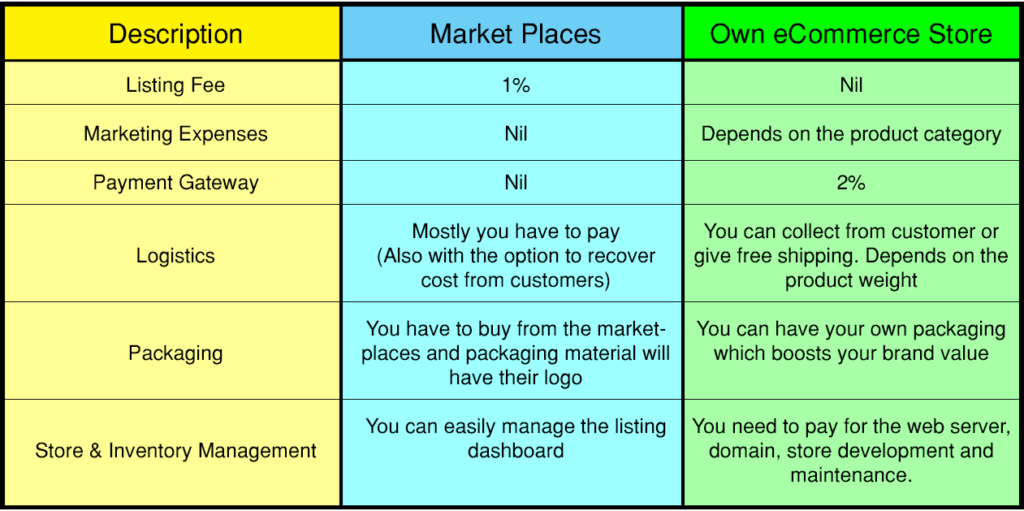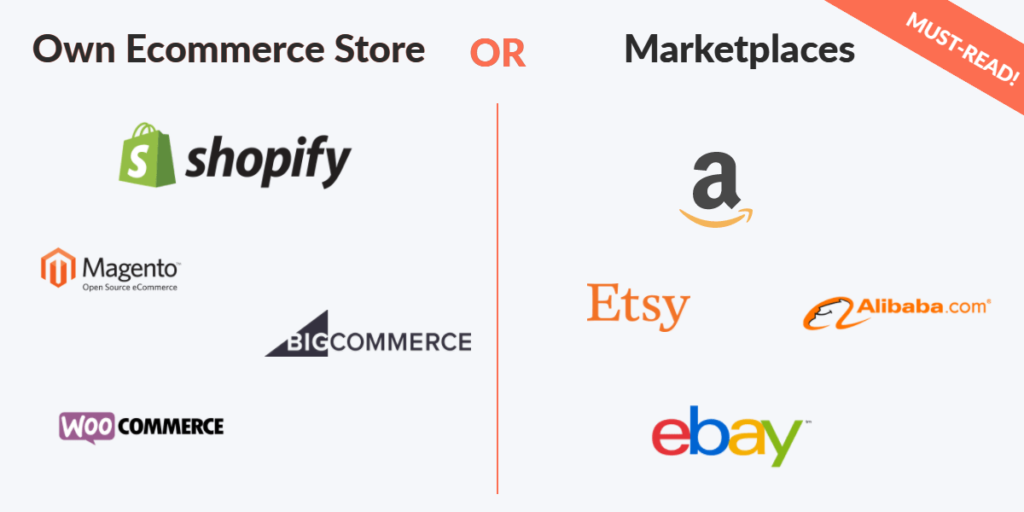Do you want to take advantage of the eCommerce growth and want to sell online? First of all, congratulations on deciding to sell online.
- You can choose any of the following options to sell online based on your expertise and resources(time, money, and manpower) Sell on marketplaces like Amazon, eBay, etc.
- Launch your own e-Commerce store
You can sell using either(or both) of these methods or both. Both have their own share of advantages and disadvantages. But you must use your precious resources like time & money effectively to maximize the results.
You have to make the right choice for your business and also make the most of your resources..
In this article, you will learn different factors that need to consider selling online.
- Control
- Transaction Fee
- Store Policy
- Visibility
- Customer Details – Know Your Customers Better
- Credibility, Trust, & Loyalty
- Marketing Expenses
- Infrastructure – Payment Gateway/Logistics
- Profit Margins
- Potential for more sales & Scalability
- Branding
- Speed
- Multiple marketplaces
And by the end of this blog post, you will be in a position to decide for yourself which is the best way to sell your product online.
Control
Control is the primary difference between both the selling options we have discussed above.
Selling your product on your own eCommerce store ensures that the complete control lies with you, right from content, product, user experience, and customer details.
On the other hand, you can decide what goes on in the marketplace by controlling the content that you update but how it is displayed or communicated can’t be controlled by you.
Marketplaces choose to go with the format that they think is good for them, not for you. Also, you won’t have access to any data about transactions/marketing activities.
For example, if you implement marketing activities offline or outside of the marketplace, you won’t know how effective it is.
With your own store, you can always get the analytics setup and get access to all the marketing and sales data you need.
Transactions fee
When a sale takes place on your own eCommerce store, you will only have to pay the payment gateway fee. But yes, remember that you are also paying for marketing your online store, website maintenance, etc.
Whereas in the case of marketplaces, you have to make payments such as listing fees, commission, etc, Usually this ranges from 10% to 25% of the product price depending on the product category and the marketplace.
Store Policy
Every marketplace has its own store policy for listing products and they may change them at any time. In the worst case, they may even block your product listing/category.
You will never know what will happen at any time and you’ll always be dependent on them for your sales. This makes the marketplace selling slightly unpredictable.
You will not be having any such issue if you own an eCommerce store, as you decide what you want to sell in your store.
Visibility
If you launch the product on the marketplace, you have an opportunity to showcase your product to the massive existing customer base of the chosen marketplace.
But, visibility for your product depends on a lot of factors such as uniqueness, conversion rate, reviews, content, etc.
There are chances that your product might be lost among so many products listed on the marketplace under the same category as yours.
Marketplaces are best for unique products that get more visibility. It’s advisable to stay away from the marketplace for selling the same kind of products if it is already crowded.
In the case of your own store, you can decide which product needs to be highlighted.
Customer details – Know your customers better
Understanding your customer’s persona is the key to your online business to grow and improve your offerings.
You have ownership of the customer’s details and connect with them through different channels to communicate with your customers when you own the online eCommerce store.
You can use these details to upsell/cross-sell/launch new products.
Most marketplaces do not allow the store owners to contact the customers or in most cases, the customer details are not shared with you. So you won’t be able to communicate with the people who have purchased products on marketplaces and understand their experience.
Credibility, Trust, & Loyalty
As a new online store, gaining people’s trust will be the biggest challenge. You can add more elements to your website that increase credibility such as product stories, press mentions, testimonials, industry-related badges, etc.
You should know that it takes time to build credibility & trust. But it will be rewarding in the long run which will increase the number of loyal customers who love your products.
Marketplaces already have millions of customers those trust their services and products. You can take advantage of this and enjoy sales by just listing the product on marketplaces (Yes! Your product should be great otherwise bad reviews will eventually lead to fewer sales).
Marketing Expenses
Customers won’t just flow in once you have launched the store.
You need to go out (Not really, go out, but you can simply run ads from your desk) and promote/market your eCommerce store to drive traffic to your store.
You need to tell a story about your product to the right audience. This plays a crucial role in your store’s success and it is the key.
The more money you put in marketing, the more traffic you get. Not only money, but you also need marketing expertise or hire experts to drive targeted traffic and convert them into sales.
Having said that, certain marketing activities involve zero investment, but they take a lot of time.
On the other hand, marketplaces are good at driving targeted traffic to their sites.
All you need to do is list the product and optimize the product listing with all the necessary details to help potential customers make the right buying decision.
Some marketplaces provide marketing options inside their platforms. Amazon offers options to market your product through its service called, Amazon Marketing Services.
Infrastructure – Payment Gateway / Logistics Issue
When you sell your product on marketplaces, all the technical things such as online payment collection, security, or logistics will be taken care of by the platform.
They have their own infrastructures for supporting the sellers. Once you signup on their platform, you can access all the services provided by them.
However, you need to pay for these services based on the number of orders that you receive. But in most of the platforms, there won’t be any charges unless you make any sales. It’s a win-win situation as you don’t pay them anything until you make a sale.
But you need to take care of all these things on your own or through help from professionals when you own an eCommerce store.
Though eCommerce platforms like Shopify, make it easy to integrate payment gateway and other services, still you need professional assistance if it involves much more technical things.
Profit Margins
Expenses are involved in both, marketplaces as well as an eCommerce store. You can decide which is the best choice considering the profit margins and efforts involved in both.
Below is the list of expenses involved to give you a fair idea of how this works. It varies from marketplace to marketplace and country to country.

Potential for more sales & Scalability
It should come down to what your business goals are and how you see the future of your store.
Even if you have a best-seller product on the marketplaces when you list the new product you have to begin from the beginning. And your sales growth depends on the category growth in the marketplace. You can’t really decide your sales growth.
If you sell some of your products successfully in your store and build a very good customer base, then you can launch your future products and you can expand your overall category and product offering.
Your sales growth is proportional to the resources that are available to you.
Branding
You might lose your brand when you are selling on marketplaces as people will likely remember the marketplace name and not your brand.
You will be doing marketing for the marketplace indirectly not your own brand and there is a higher chance that your customer might be exposed to your competitor’s products and you losing a sale to them.
You can build your brand and loyal customer base when you are selling in your store, which will help you in the long run.
Why do want to market someone else company when you can do it on your own.
Speed
Listing your products on marketplaces is straightforward and it can be done in a day if you just have all the product details & documents ready.
But launching your own online store involves a lot of activities like choosing a domain for your store, server, website development, payment gateway, logistics, etc.
eCommerce platforms such as Shopify and Bigcommerce make it easier to create eCommerce stores, still, you might need to work on the other aspects of the business process. It usually takes one-three months to launch your own eCommerce store.
Multiple marketplaces
In any country, there will be multiple marketplaces that are popular among the people. Once you choose to sell your product on different marketplaces, then you have to invest time to focus on all the marketplaces.
So, Which is best for your business?
There is no common answer to this question because all businesses are not the same.
To decide which is the best for your business — Marketplace or own eCommerce store, Answer the following questions and think about your business goals:
- Where are your potential customers hanging out?
- How much time do you have?
- How much money do you need?
- What kind of resources do you have?
By answering the above questions, you can choose the best way to sell your products online.
However, as a thumb rule,
If you believe that your product is truly unique and deserves the time and effort to be marketed individually, it’s worth looking into selling via your own online store.
If it is a more generic product, it is probably best to sell on Amazon and eBay.
Even if you are selling through your own online store, you can use marketplaces as one of the sales channels that fuel your sales and supports your store financially.
You can use coupons, product packages, and other marketing activities with the packaging/invoices when you are selling in the marketplaces.
Final Thoughts!
Look at your business goals and products to help you to decide and prepare for the future!
Still, confused?
Do you need help in choosing the right way to sell your products online? Comment below or just shoot me an email to hear back from me with suggestions.
All the best!!!

